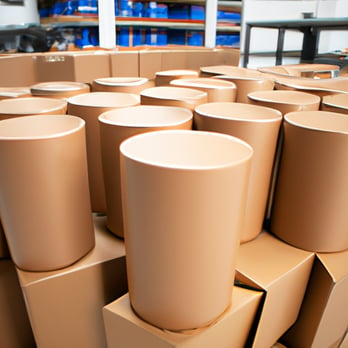In packaging manufacturing, staying ahead of the competition requires a strategic approach to production scheduling. Traditional methods of scheduling often fall short when it comes to meeting the demands of today's fast-paced, highly dynamic supply chains. However, with the integration of AI-powered tools, such as real-time production scheduling systems, supply chain managers can unlock unprecedented levels of efficiency and responsiveness.

In this blog, we will explore the transformative potential of AI-driven production scheduling, focusing on the integration between PlanetTogether and leading ERP, SCM, and MES systems like SAP, Oracle, Microsoft, Kinaxis, and Aveva.
The Need for Real-Time Production Scheduling in Packaging Manufacturing
In the packaging manufacturing industry, the challenges of traditional production scheduling methods are becoming increasingly apparent. The constant changes in customer demands, raw material availability, equipment maintenance, and workforce scheduling require a more dynamic approach. Real-time production scheduling offers a solution to these challenges, providing benefits such as enhanced agility, improved productivity, and better utilization of resources. By leveraging AI technologies, supply chain managers can make informed decisions and optimize production schedules based on real-time data.
Introducing PlanetTogether: An AI-Powered Production Scheduling Solution
PlanetTogether is an advanced AI-powered production scheduling system designed to address the unique needs of packaging manufacturers. This software offers a range of features and functionalities, including intelligent algorithm-based scheduling, optimization capabilities, and real-time data integration. By leveraging PlanetTogether, packaging manufacturers can streamline their operations, reduce lead times, increase production efficiency, and improve on-time delivery performance. The software's user-friendly interface and intuitive workflows make it a valuable tool for supply chain managers seeking to optimize their production schedules.
Integration between PlanetTogether and Leading ERP, SCM, and MES Systems
To harness the full potential of AI-driven production scheduling, integration with existing ERP, SCM, and MES systems is crucial. Integration allows seamless data flow between systems, enabling real-time visibility, accurate forecasting, and streamlined decision-making. PlanetTogether offers integration capabilities with industry-leading systems like SAP, Oracle, Microsoft, Kinaxis, Aveva, and other ERP, SCM, and MES platforms. This integration enables packaging manufacturers to leverage their existing infrastructure while augmenting it with the power of AI-driven real-time production scheduling.
The Benefits of AI-Driven Real-Time Production Scheduling
Implementing AI-driven real-time production scheduling brings a myriad of benefits to packaging manufacturers:
Increased Efficiency and Reduced Downtime: Real-time scheduling optimizes machine utilization, reduces changeover times, and minimizes downtime, resulting in enhanced production efficiency.
Enhanced Customer Satisfaction and On-Time Delivery: Accurate scheduling based on real-time data ensures timely order fulfillment, leading to improved customer satisfaction and increased loyalty.
Improved Inventory Management and Cost Optimization: AI-powered scheduling helps optimize inventory levels, reduces excess stock, and minimizes carrying costs, leading to improved cost management.
Proactive Issue Resolution and Exception Handling: Real-time insights enable proactive identification and resolution of production issues, minimizing disruptions and avoiding costly delays.
Data-Driven Decision Making and Predictive Analytics: AI algorithms analyze vast amounts of data to provide actionable insights, enabling supply chain managers to make informed decisions and predict future demand patterns.
Scalability and Adaptability to Changing Market Conditions: AI-driven scheduling systems are highly scalable and can adapt to dynamic market conditions, allowing packaging manufacturers to respond swiftly to changes and seize new opportunities.
Successful Implementation Strategies and Best Practices
To ensure successful implementation of AI-driven real-time production scheduling, supply chain managers should consider the following strategies and best practices:
Pre-implementation Planning and System Integration: Thoroughly assess the existing infrastructure, define integration requirements, and develop a comprehensive implementation plan.
Change Management and Training for Personnel: Ensure that employees understand the benefits of the new system and provide training to facilitate a smooth transition.
Continuous Improvement and Feedback Loops: Establish feedback mechanisms to gather insights from stakeholders and continuously improve the scheduling processes.
Collaboration with Vendors and Technology Partners: Foster collaboration with vendors and technology partners to leverage their expertise and support during implementation and beyond.
Monitoring Performance Metrics and KPIs: Define relevant performance metrics and key performance indicators (KPIs) to track the effectiveness and efficiency of the AI-driven scheduling system.
Future Trends and the Evolution of AI in Packaging Manufacturing: Stay informed about emerging trends and advancements in AI technologies to remain at the forefront of innovation in the packaging manufacturing industry.
The integration of AI-powered real-time production scheduling systems, such as PlanetTogether, with leading ERP, SCM, and MES platforms presents a game-changing opportunity for supply chain managers in the packaging manufacturing industry. By harnessing the power of AI, organizations can achieve unparalleled levels of efficiency, responsiveness, and operational excellence. Embracing this transformative technology will enable packaging manufacturers to thrive in an increasingly competitive landscape, meet customer expectations, optimize resource utilization, and adapt to dynamic market conditions. The future of packaging manufacturing is here, and it's driven by AI-powered real-time production scheduling.
